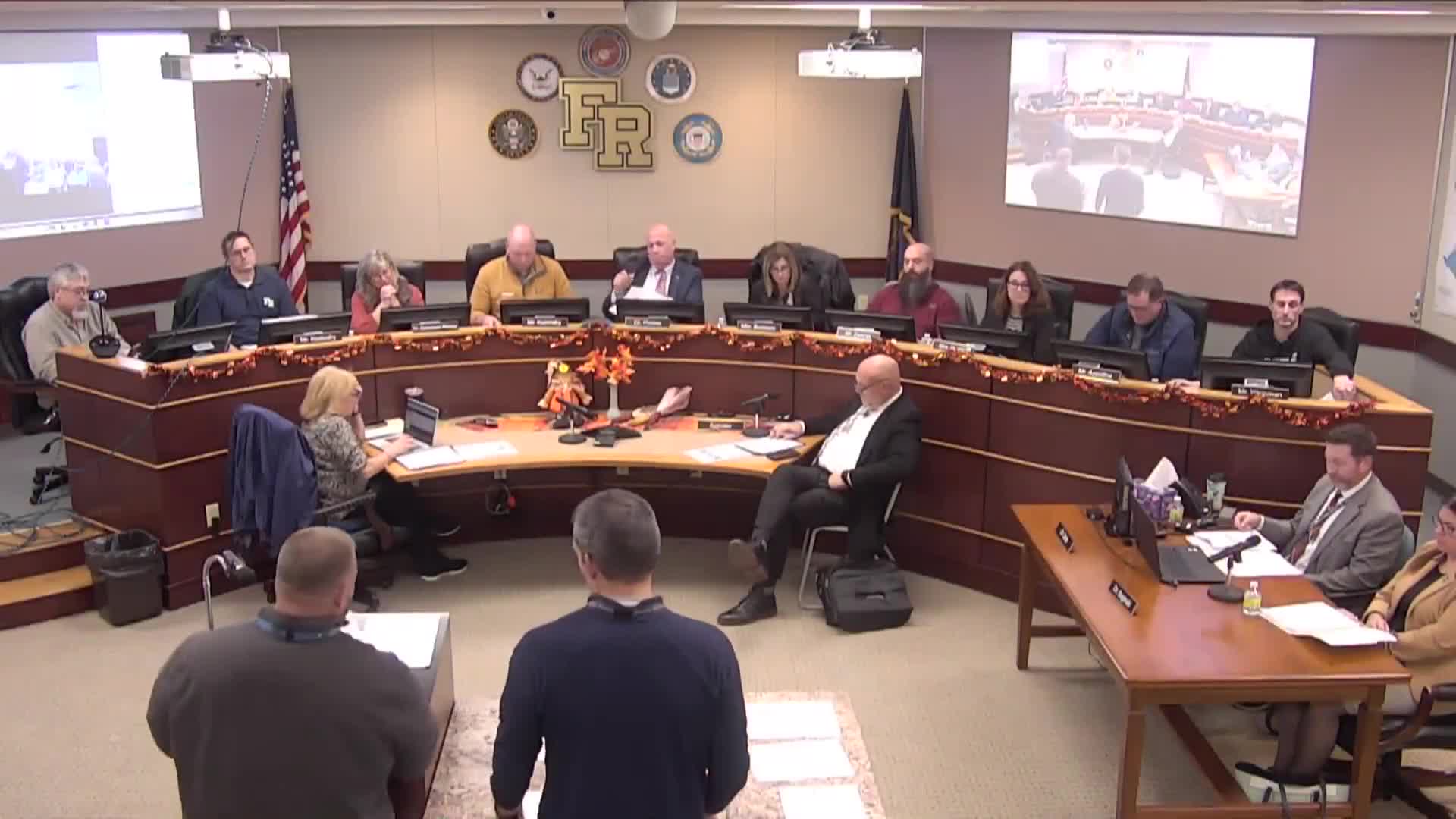Franklin Regional board approves authorization to pursue $10M field renovation financing after wide-ranging presentation and public comment
Get AI-powered insights, summaries, and transcripts
Subscribe
Summary
The school board heard vendor presentations and community testimony, and approved consent agenda items that include authorization to pursue up to $10.5 million in design-build financing for a multi-site athletic field renovation. Officials said the plan would be phased to limit budgetary impact and could add roughly 1.93 mills in an illustrative scenario.
The Franklin Regional School Board on Nov. 17 authorized district staff to proceed with the next steps in a proposed athletics field renovation after a year‑and‑a‑half planning process, extensive vendor presentations and more than an hour of public comment.
The project package presented to the board covers three main areas — Haymaker (baseball), the softball/tennis complex and a new multipurpose turf field — and was offered to the board under a design‑build procurement model. District staff and their athletic leaders argued the renovations are necessary because existing fields are poor drainage, cause lost practices and games, and are increasingly costly to maintain.
"These fields would be a tremendous asset to our student athletes as well as our community," the district athletic director said, summarizing the programmatic benefits of added turf and multipurpose surfaces that would allow simultaneous practices and reduce weather cancellations.
Tarkett Sports representatives (Mike Rufo and a regional manager) described a single‑vendor design‑build approach that groups surfacing, track, civil design and vertical work under one umbrella and said cooperative purchasing contracts would be third‑party certified to confirm competitive pricing. The vendor presentation included a stepwise process from discovery through permitting to shovel‑ready construction and an estimated build time of five to six months once permits and final documents are in place.
District officials and the vendor presented an assembled budget in the low‑tens of millions; the vendor cited an assembled example figure "a little over $10,600,000" as the package that included alternates and necessary site work. The district identified a financing pathway involving a general obligation bond targeted at $10,000,000 or less to preserve bank‑qualified tax treatment; administrators said the design‑build cap for board consideration would be $10,500,000.
Finance advisor Zach Williard of PFM outlined a debt structure that ties amortization to each asset''s useful life and uses a "wrap‑around" approach to minimize immediate budgetary impact. In an illustrative scenario Williard said, "That total is about 1.93 mills," and staff translated that to roughly $70 per year for a property with a $35,000 assessed value as an example of potential taxpayer impact if phased as presented.
Board members pressed staff and vendors on community engagement, traffic and parking flow, future phases (locker rooms, pool, strength and conditioning facilities) and lifecycle replacement costs for turf. District staff said traffic and parking concerns would be studied in later phases, noted maintenance time and costs for current grass fields (tens of thousands of dollars annually in materials and dozens of staff hours weekly), and said turf maintenance agreements would be approximately $5,000 a year.
Multiple public speakers urged the board to proceed but asked for greater transparency and time for public review. Some residents flagged Haymaker's community heritage and asked whether historic‑site considerations or fundraising could offset taxpayer costs. District leaders said Haymaker would be covered by a 50‑year lease at $1 per year that secures student use and operations for the district.
The board moved the consent agenda that included an authorization to proceed with financing work and a reimbursement resolution; the motion passed as part of consent agenda items 1–16, enabling the financing team to continue preparatory work ahead of a formal borrowing vote anticipated at a February meeting and potential settlement by mid‑March 2026. If the district proceeds, officials said construction could be completed by December 2026 to avoid disrupting spring seasons.
What happens next
The authorization approved Nov. 17 does not obligate the board to borrow; it allows the financing team to work with underwriters, solicitors and advisors to prepare a prospectus, credit rating materials and a debt resolution for a formal vote. A bond vote is tentatively scheduled for Feb. 9, 2026; staff said mid‑March 2026 is a likely settlement date if the board votes to issue debt.
